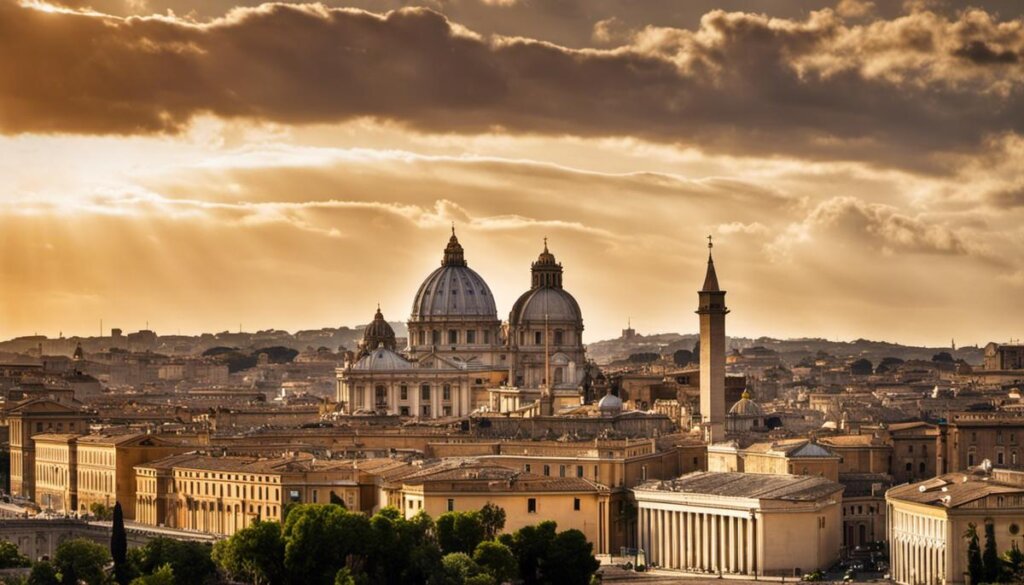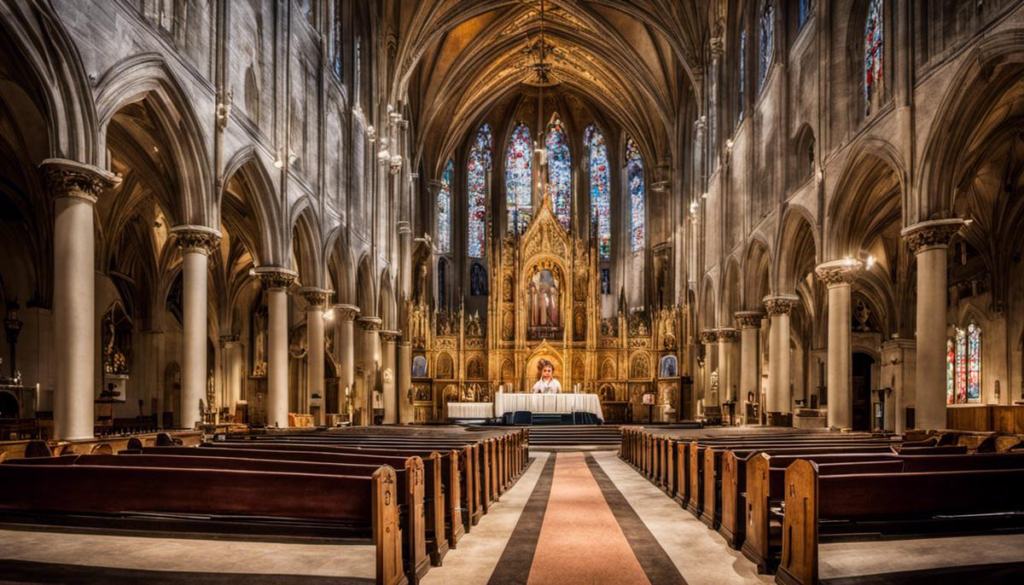The Influence Of Politics in the Church
Contents
- Historical Context of the influence of politics in the Church
- Case Studies of the Influence of Politics in Various Church Denominations
- Church Involvement in Political Activism
- Criticism and Controversies Regarding the influence of politics in the Church
- The Future of the influence of politics in the Church
- Emerging Trends: Political Involvement in Religious Institutions
- Experts’ Predictions: Increasing Role of Churches in Political Advocacy
- Implications: The Shift from Preaching to Advocacy
- Future Engagement: Church as a Political Action Group
- Consequences: Loss of Traditional Roles
- The Balance: Politics and Spirituality
Throughout history, the intertwining of politics and religion has had profound implications for societies worldwide. The Christian Church, with its myriad denominations, has not been exempt from this phenomenon, bearing a rich history of political influence in the church and involvement. From key historical events such as the establishment of the Vatican City State, the church’s political influence has evolved and manifested in various ways. The diverse denominations within Christianity have witnessed and continue to experience unique political influences, affecting dogmas, impacting the endorsement of political candidates, and challenging the concept of separation of church and state. Furthermore, churches have taken a proactive role in political activism, influencing significant social issues like civil rights, abortion, and LGBTQ+ rights.
Historical Context of Political Influence in the Church
The Vatican City State and Political Influence of the Church
The Vatican City State is a powerful example of the close relationship between politics and religion. Founded in 1929, it stands as a sovereign entity, independent of Italy, and is the result of the Lateran Treaty between the Holy See and Italy. This agreement solidified the Church’s distinct political status, allowing it to operate independently within its territories and internationally.
Religious Influence in Political Legislation
Throughout history, the church has often exerted political influence through law-making processes. During the Middle Ages, the Roman Catholic Church was intimately involved in state affairs of most European countries, especially influencing decisions related to marriage, inheritance, and criminal punishments. This intertwined relationship between religion and politics is also visible in the English laws of the medieval period, the Canon Law, which was significantly influenced by church policies in matters of marriage, morality and clerical conduct.
The Church and Social Movements
The church’s influence is not restricted to legislation alone. Throughout the 20th century, religious institutions have often been at the forefront of societal change. For instance, Reverend Martin Luther King Jr. was a prominent leader in the U.S. Civil Rights Movement, championing for equality and justice from a predominantly Christian perspective. Similarly, churches contributed significantly during the Anti-Apartheid Movement in South Africa and in advocating for democracy in Eastern Europe.
Church’s Role in Political Campaigns
Another significant way the church has been involved in politics is through endorsing party candidates or policies. Churches sometimes use their influence to mobilize support for specific political parties or candidates that align with their doctrinal beliefs. In the United States, the Internal Revenue Service prohibits religious organizations from endorsing or opposing political candidates.
Papal Declarations and Encyclicals
Over the years, popes have also issued declarations or encyclicals addressing various societal issues, such as economic injustice, climate change, and the morality of wars, which have political implications. Pope Francis’s 2015 encyclical, Laudato Si, for instance, urged global leaders to respond more assertively to climate change, demonstrating how the church can influence public opinion and political action on a global scale.
Complexities and Controversies of Political Involvement in Churches
Despite boasting a rich history of involvement in political affairs, the realm of church and politics has been engulfed by disputes. Critics proclaim that this relationship breaches the principle of church and state separation, arguing that religious teachings should not dictate political discourse. Meanwhile, some express worries that political engagement could detract from the church’s central spiritual purpose and deep-rooted divisions within the congregation over polarizing political issues could appear. This critical examination of the churches’ political sway remains an ongoing debate, accentuating the multifaceted nature of the issue.

Case Studies of Political Influence in Various Denominations
Politics Intersects with Faith: The Catholic Church as a Global Phenomenon
Being the most extensive Christian denomination, the Catholic Church exercises a considerable influence on both domestic and global politics. The political attitudes throughout the Church are profoundly shaped by theological doctrines, discernible in their stance on a diverse array of issues spanning from abortion to same-sex marriage and immigration. The hierarchical organization of the Catholic Church bestows significant power upon the Pope and other religious figureheads, which in turn permeates the political landscape in broad strokes. For instance, Pope Francis, renowned for his progressive ideologies, has often provided commentary on environmental protection, immigrants’ rights, and wealth disparity, suggesting a paradigm shift in the general political outlook of the Church.
On a more localized scale, there have been instances where Catholic religious heads either endorse or rebuff political candidates aligning with or diverging from the Church’s teachings. However, such practices often lead to contentious debate due to concerns around breaching the church and state separation principle, and qualms over instigating ‘litmus test‘ politics.
Evangelical Christianity and the American Political Landscape
Evangelical Christianity plays a pivotal role in American politics, particularly in the Republican Party. Evangelical leaders have a strong influence on their followers, leading to trends like the “Moral Majority” in the 1980s. Support from evangelical Christians has greatly influenced the election and policies of various politicians.
Politically, Evangelicals are known for their conservative stances on issues such as abortion and gay marriage, but they also play a major role in issues like immigration and climate change. However, one key point of controversy is when religious leaders endorse specific political candidates, as this comes in conflict with the principle of separation of church and state.
Black Churches and Civil Rights
Historically, Black churches have been deeply involved in political activism, particularly regarding the civil rights movement when many Black churches served as hubs for organizing protests and demonstrations. Leaders like Martin Luther King Jr. utilized the power and influence of the church to mobilize support for their cause. Even today, Black churches continue to wield significant political influence especially within Democratic Party. However, this political involvement often straddles navigating the line between spiritual leadership and political advocacy.
Understanding the Intricacies of Church-Politics Relationship
Religious denominations exert a diverse and complex influence on national politics, despite significant distinctions between and within various groups. The law prohibits churches from supporting specific political candidates; however, the essence of their religious doctrine implicitly influences their political leanings. Concurrently, churches grapple with the delicate balance of upholding their religious obligations while maintaining the established principle of church-state separation.

Church Involvement in Political Activism
Tracing the Historical Precedence of Political Activism in Churches
Religious communities in America have been significant in steering social and political movements since the 18th century. Notable early American religious communities like the Quakers played an instrumental role in the abolitionist movement, actively seeking an end to slavery. In the 20th century, African-American churches became a crux for organization and activism during the civil rights movement, with prominent pastors such as Reverend Dr. Martin Luther King Jr. at the forefront.
Church Influence on Civil Rights Issues
Churches played a significant role in shaping the Civil Rights Movement in the 1950s and 1960s. Churches not only provided meeting places for civil rights activists but also put forth leadership. Prominent religious leaders like Dr. Martin Luther King Jr., a Baptist pastor, led nonviolent protests against racial segregation. Additionally, they provided moral and spiritual support that galvanized activists and sympathetic onlookers alike.
Impact on Abortion Legislation
Religion and the issue of abortion have long been intertwined in America, with the Catholic Church leading the charge towards anti-abortion legislation. Church teachings, such as the belief in the sanctity of life from conception, have shaped the anti-abortion stance of many religiously affiliated activists and politicians. On the other side, some Protestant denominations support a more nuanced or conditional view on abortion, highlighting that the church’s impact on abortion is not unilateral but varying across religious groups.
Churches and LGBTQ+ Rights
The approach of churches to LGBTQ+ rights has been diverse and complex. Some denominations have been unwavering opponents of LGBTQ+ rights, often citing scriptural interpretations to justify their stance. However, a number of churches and religious organizations have evolved to become strong proponents of LGBTQ+ rights, challenging traditional interpretations of scripture and pushing for acceptance and equality. These differing stances on LGBTQ+ rights reflect the broader political and social divide on this issue, with churches playing a consequential role on both sides.
Church and Politics: An Intertwined Influence
Despite the separation of church and state being a fundamental tenet of the United States Constitution, the crucial role churches have played in crafting public sentiment and exerting legislative dominance on key societal concerns cannot be dismissed. Churches, through past and present roles in leadership, organizing civic protests, and influencing the political orientation of their congregation, have etched significant imprints onto America’s political tapestry.

Criticism and Controversies Regarding Political Influence in the Church
Contours of Church-State Separation Debates
Church-political intersection invokes impassioned debates around the concept of church-state separation. The First Amendment of the United States Constitution proclaims a prohibition on legislation respecting religious establishments or interfering with religious freedom. This has spurred diverse interpretations, with some advocating for complete severed ties between religion and politics, while others express that faith-based perspectives are intrinsically woven with moral judgments and, by extension, impact political choices.
Adversaries argue that when churches venture into the mire of politics and governance, they risk defiling their spiritual essence. However, supporters posit that it’s a church’s mandate to sway public policies towards reflecting its religious and ethical values. They hold that such actions aren’t unconstitutional as long as no explicit endorsement of a particular political platform is made.
Tax-Exemption Status Controversy
A significant criticism of political influence in the church pertains to tax-exempt status. Religious organizations in the United States are granted tax exemption under the Internal Revenue Code section 501(c)(3), which stipulates that tax-exempt nonprofits cannot participate in any campaign activity for or against political candidates. However, it does not restrain religious organizations from engaging in public policy advocacy or lobbying, blurring the line between legal religious influence and political campaigning.
Critics argue that churches should lose their tax-exempt status if they participate in political activity, equating it to government subsidies for political endorsements. Supporters claim that stripping religious organizations of their tax exemptions due to political involvement would infringe upon their First Amendment rights.
Public Response to Partisan Politics in Religious Institutions
The rising political influence in the church has elicited a variety of public reactions, predominantly in relation to the appearance of partisan politics in religious spaces. A noteworthy segment of the American population opines that churches and other religious institutions should abstain from espousing political opinions, whilst there are others who believe that discussing political and societal matters is a crucial part of a religious leader’s duty.
Religious institutions, especially churches, are increasingly perceived as platforms for partisan politics, as there are instances of churches endorsing political candidates or showing support for certain political causes. This has led to worries about churches becoming a tool for political maneuvering or creating rifts within their congregations.
Public opinion polls divulge a divide in perspective. Some view political involvement in the church as a blatant disrespect of the church-state separation principle, while others consider it an important component of practicing their faith. The disagreement primarily emerges from differences in religious beliefs, political affiliations, and demographic factors, making it more divisive in the current atmosphere of intense political unrest.

The Future of Political Influence in the Church
Emerging Trends: Political Involvement in Religious Institutions
In the current societal context, there is a noticeable increase in religious institutions, including evangelical, Catholic, and other denominations, engaging in political matters. They generally gravitate towards political subjects that have moral, ethical, or spiritual ramifications, such as issues related to abortion, LGBTQ rights, religious freedom, immigration, and climate change.
Experts’ Predictions: Increasing Role of Churches in Political Advocacy
According to experts, this trend of political engagement is likely to continue and even intensify in the future. Churches have a significant influence on their members, and political strategists recognize this power. As such, it is anticipated that political entities might invest more efforts into lobbying churches to support their causes or candidates. Further, churches might also take more active stances in political issues that they see as aligned with their beliefs and values.
Implications: The Shift from Preaching to Advocacy
A key implication of this shift towards political involvement is a change in the role that churches see themselves playing in their communities and broader society. Historically, churches’ primary emphasis has been on spiritual nurture, teaching, and providing community support. But as churches take on more political advocacy roles, this balance could change. There might be more emphasis on shaping public policy, advocating for social change, and influencing political decisions. This new role encompasses both opportunities and challenges for the church.
Future Engagement: Church as a Political Action Group
As political influence in churches continues to rise, some predict that churches could become more similar to political action groups. This would mean organizing members to campaign for specific issues, lobbying political leaders, and raising funds for political causes.
Consequences: Loss of Traditional Roles
On the flip side, this increased political involvement may come at the expense of the traditional roles that churches have played in their communities. There is a risk that churches may become so involved in political discourse and action that they neglect their primary duties of providing spiritual guidance and support to their congregations. Without careful attention, this could lead to a loss of focus and a potential weakening of the church’s core mission.
The Balance: Politics and Spirituality
The challenge for the future of the church, therefore, lies in finding and maintaining the right balance between political engagement and spiritual service. Churches need to be able to participate in the political discourse, shape public opinion and policy, and uphold their core beliefs and values, all while not losing sight of their spiritual obligations to their congregations and communities. This is a delicate balancing act that will require thoughtful reflection, wise decision-making, and an ongoing commitment to the church’s role as both a spiritual and societal institution.

As history unfolds and societies evolve, so too does the nature of political influence within the church. Presently, this influence has many facades, often leading to criticism, controversy, and intense debates, especially with topics such as separation of church and state, tax-exemption statuses for religious institutions, and political partisanship in religious environments under scrutiny. While the discussion continues, one cannot exclude the forward-looking perspective that points towards the future of political influence in the church. By examining current trends and expert predictions, the church’s future engagement in the political sphere can be anticipated, creating opportunity for deeper understanding and dialogues about the profound implications of this influence.

Post Comment